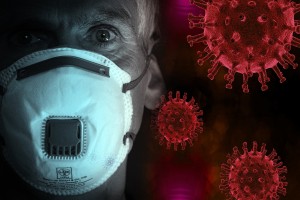
Many countries simply do not have enough oxygen available to the Corona victims
Geneva: Taking serious view of an “an exponential increase” in COVID-19 cases, the World Health Organisation has urged nations to take immediate action to prevent further deaths, essential health services from collapsing and schools shutting again.
“We are at a critical juncture in this pandemic, particularly in the northern hemisphere. The next few months are going to be very tough and some countries are on a dangerous track,” WHO Director-General Dr. Tedros Adhanom Ghebreyesus told media persons last night. He expressed his concern that too many countries are seeing an exponential increase in cases and that is now leading to hospitals and ICU running close or above capacity. “…and we’re still only in October,” he said.
Oxygen is one of the most essential medicines for saving patients with COVID-19, and many other conditions. Many countries simply do not have enough oxygen available to assist sick patients as they struggle to breathe.
Estimates suggest that some of the poorest countries may have just 5 to 20 percent of the oxygen that they need for patient care. Back in June, when there were approximately 140 thousand new COVID-19 cases a day, the global need for oxygen was estimated to be approximately 88 thousand large cylinders each day across the world. As daily cases rise around the world to over 400 thousand, the need for oxygen has gone up to 1.2 million cylinders each day, just in low- and middle-income alone, which is 13 times higher.
Dr. Ghebreyesus noted that while early in the pandemic, the WHO’s approach was to scale up oxygen in the most vulnerable countries by procuring and distributing oxygen concentrators, it had led to over 30 thousand concentrators, 40 thousand pulse oximeters and patient monitors to reach 121 countries, including 37 that are classified as fragile. This included installing pressure swing adsorption plants – or PSAs – that would be able to cover the supply needed for a large hospital and district health facilities in the area.
Even then, Somalia, Chad and South Sudan had to rely exclusively on oxygen cylinders from private vendors that are often traveling long distances and come with a high price-tag. Dr. Ghebreyesus informed that WHO has been working with the ministries of health in these three countries to design oxygen plants fit for their local needs, which will result in sustainable and self sufficient oxygen supply.
“WHO is committed to working in solidarity with all governments, partners and the private sector to scale up sustainable oxygen supply,” the WHO DG said. However, through the pandemic, as the demand for oxygen has grown exponentially, WHO is now working with partners to harness solar power to run oxygen concentrators in remote places where electricity supply is unreliable, and to reduce costs.
“One of the main barriers to medical oxygen is the high transport costs of the cylinders to the health facilities,” he said and informed that hence in Kenya, a private sector company has positioned oxygen plants near clusters of health facilities and uses a milk delivery system to deliver oxygen to more than 140 clinics.
“Incentivizing the business sector to change its approach and model is key to ensuring sustainable oxygen in low- and middle-income countries. And to be successful the health workforce needs to be ready,” he said.
Dr. Ghebreyesus reiterated the WHO’s commitment to working in solidarity with all governments, partners and the private sector to scale up sustainable oxygen supply.
He further gave a specific message for those countries that had successfully brought COVID-19 transmission under control: “now is the time to double down to keep transmission at a low level, be vigilant, be ready to identify and cases and clusters and take quick action. Do not allow the virus to take hold again.” He said governments were required to carry out the basic steps of speaking to people who were infected with the virus and their contacts and giving them specific instructions on what to do next. “If governments are able to hone their contact tracing systems and focus on isolating all cases and quarantining contacts, then mandatory stay at home orders for everyone can be avoided,” he asserted.
The WHO today also called on governments to carry out five key actions:
- Assess the current outbreak situation in your country based on the latest data you have to hand. Conduct honest analysis and consider the good, the bad and the ugly.
- For those countries where cases, hospitalizations and ICU rates are rising, make the necessary adjustments and course correct as quickly as possible.
- It’s important to be clear and honest with the public about the status of the pandemic in your country and what is needed from every citizen to get through this pandemic together.
- Put systems in place to make it easier for citizens to comply with the measures that are advised. This means, if people are told to isolate or quarantine, or businesses have to close temporarily, governments need to do everything they can to assist individuals, families and businesses.
- The next few months for many people will be difficult.
The WHO further reiterated that key to a united front against the virus was sharing resources equitably.




